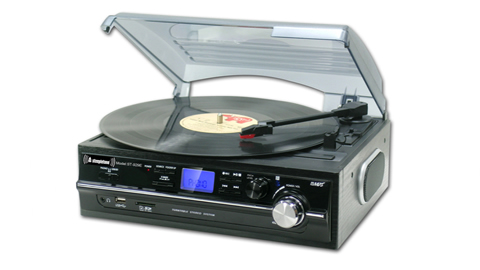Top 10 Businesses Killed by the Internet

For this list, we're taking a look at types of businesses, jobs or products that saw a significant decline in popularity thanks to the explosion of the information superhighway. Welcome to WatchMojo.com, and today we're counting down our picks for the top 10 businesses killed by the Internet. Special thanks to our users jvt128, Thedarkfoxcannon and Ian Sloan for submitting the idea on our Suggest Page at WatchMojo.comsuggest
#10: The Stock Broker
As will be a common thread in this list, the online route gained ground by being quicker and easier. Trading over the web became an option for the “buy low, sell high” set in late 1994. Before then, would-be investors would have to call a guy who would call a guy and well, you’ve seen “Wall Street.” While some sites have simply replaced the phone call, many allow the user to tap into the exchange directly. Greed may be good, but pointing and clicking is even better.
#9: The Encyclopedia
Here’s the problem. The Internet updates daily. Books? Not so much. And let’s face it; you’re not going to learn about twerking from Funk & Wagnalls. In the new millennium, Wikipedia bloomed and “Google it” became a phrase, while encyclopedia sales dropped. In 2012, the printed Encyclopedia Britannica was officially declared dead, making the 32-volume and 129 pound 2010 edition its last. It wasn’t just paper knowledge that fell to the wiki either, as Microsoft’s CD-ROM-based Encarta ctrl-alt-deleted in 2009.
#8: The Travel Agent
Although an agent likely knows Sydney, Nova Scotia from Sydney, Australia, the travel company industry has been declining since the late ‘90s. With the rise of popular and reliable travel sites throughout the 2000s, most would-be vacationers now go to the web rather than the agent. Airlines have also cut out the middle person, opting to market and sell directly to flyers. With cheaper fees for customers and fewer commissions for airlines, travel sites certainly aren’t going anywhere.
#7: The Fax Machine
While there are still a few kicking around in the business world, for everyday people when the Internet came, the fax machine went. Although useful in its time, the adoption of email, attachments and high resolution scanning meant a sharp decline in fax usage. Email had the advantage of not only being faster but it also did not have to be printed to be read.
#6: The Video Store
It’s not just the mom-and-pop shops here; even the big boys have gone the way of the Betamax. Industry leader Blockbuster, for example, had 9,000 locations in 2004. By 2013, they were down to just 300 corporate-owned stores, which closed for good in January of 2014. In the end, the online competition was just too fierce. iTunes rentals might be easy and Netflix might be awesome, but let’s face it: the adult section of the internet is way, way seedier.
#5: The Phone Book
Fingers still do the walking, but they walk straight to the keyboard. And the freshly delivered phone book? Straight to the recycling bin. Some American cities go even more extreme than that: in 2012, San Francisco, California actually banned the distribution of the Yellow Pages unless a resident specifically opts in. That move came after officials estimated that the 1.6 million phone books previously received in the city could equal 8 and a half times the height of Mount Everest.
#4: The Map
When you can look at your phone and see where you are, there isn’t much need to open a map and see where you might be. Long gone are the days of folded maps and road atlases in the glove box. Thanks to smart phones, pretty much everyone has satellite navigation in his or her pocket. It’s not just motorists either. Even hikers and ramblers have given up on the pulp in favor of apps and portable GPS usage, which has spawned the activity known as geocaching.
#3: The Record Store
Since the advent of both legal and pirated music downloads, the record store has suffered severely. Though 2011 saw digital music sales increase by almost 10% around the world, physical sales are projected to decline by more than 75% by 2016. While shops still have their followers, the selection and immediacy of online music sources like iTunes, Amazon, and YouTube make the fight extremely lopsided. Even though vinyl has made a comeback in recent years, record stores still appear to be on life-support despite Record Store Day being an annual event since 2008.
#2: The Paper
While newspapers and magazines are not officially dead, life as they once knew it is over. After a decade of growth, the Internet overtook the traditional newspaper as a go-to news source late in the noughties. In the first half of 2009, over 100 newspapers closed in the U.S. alone. Online advertising continues to grow, showing that where readers go, ad dollars follow. The paper may still lead in yard sale notices and “Family Circus” cartoons but for breaking and real-time news, the Internet is king.
Before we unveil our top pick, here are a few honorable mentions.
- The Book Store
- The TV Network
- The 1-900 Number
#1: The Mail
It’s called snail mail for a reason. Which sounds easier: click a button and have your message sent instantly? Or buy a pen, paper, an envelope, stamp, get writer’s cramp, a mouthful of glue, and wait 4 days? Sure, handwritten notes are more personal and even junk mail is nicer than SPAM; but its speed, convenience, and price puts email well ahead of its paper competitor. All of which has caused postal systems worldwide to see layoffs, price increases, and the elimination of services.
Do you agree with our list? What is your favorite business to be killed by the internet? For more moribund Top 10s published daily, be sure to subscribe to WatchMojo.com.
